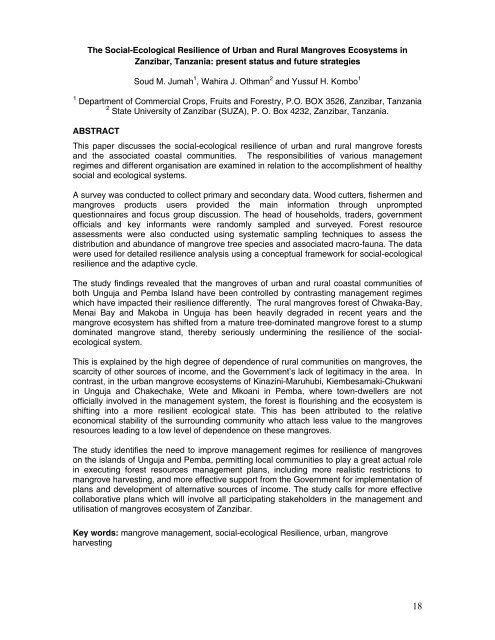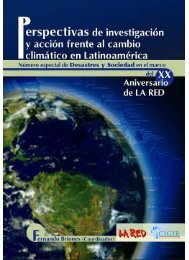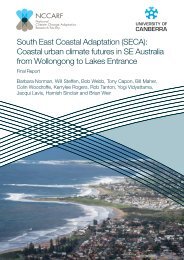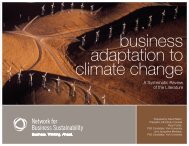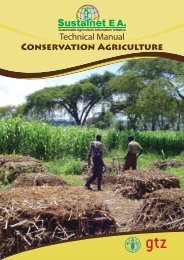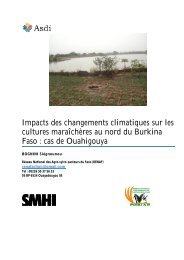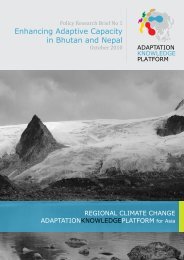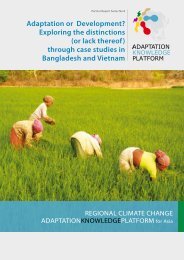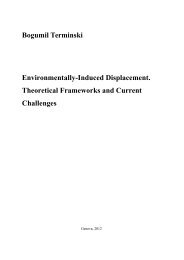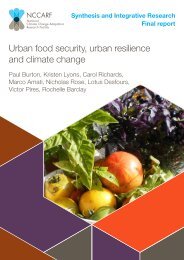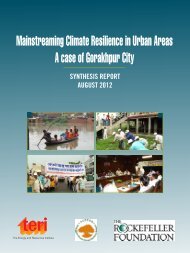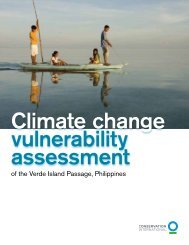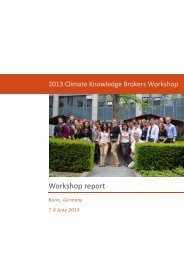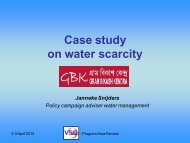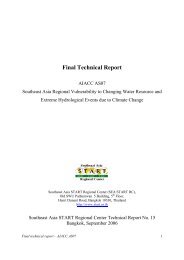Scientific and Technical Symposium on Sustainable Mangrove ...
Scientific and Technical Symposium on Sustainable Mangrove ...
Scientific and Technical Symposium on Sustainable Mangrove ...
Create successful ePaper yourself
Turn your PDF publications into a flip-book with our unique Google optimized e-Paper software.
The Social-Ecological Resilience of Urban <str<strong>on</strong>g>and</str<strong>on</strong>g> Rural <strong>Mangrove</strong>s Ecosystems inZanzibar, Tanzania: present status <str<strong>on</strong>g>and</str<strong>on</strong>g> future strategiesSoud M. Jumah 1 , Wahira J. Othman 2 <str<strong>on</strong>g>and</str<strong>on</strong>g> Yussuf H. Kombo 11 Department of Commercial Crops, Fruits <str<strong>on</strong>g>and</str<strong>on</strong>g> Forestry, P.O. BOX 3526, Zanzibar, Tanzania2 State University of Zanzibar (SUZA), P. O. Box 4232, Zanzibar, Tanzania.ABSTRACTThis paper discusses the social-ecological resilience of urban <str<strong>on</strong>g>and</str<strong>on</strong>g> rural mangrove forests<str<strong>on</strong>g>and</str<strong>on</strong>g> the associated coastal communities. The resp<strong>on</strong>sibilities of various managementregimes <str<strong>on</strong>g>and</str<strong>on</strong>g> different organisati<strong>on</strong> are examined in relati<strong>on</strong> to the accomplishment of healthysocial <str<strong>on</strong>g>and</str<strong>on</strong>g> ecological systems.A survey was c<strong>on</strong>ducted to collect primary <str<strong>on</strong>g>and</str<strong>on</strong>g> sec<strong>on</strong>dary data. Wood cutters, fishermen <str<strong>on</strong>g>and</str<strong>on</strong>g>mangroves products users provided the main informati<strong>on</strong> through unpromptedquesti<strong>on</strong>naires <str<strong>on</strong>g>and</str<strong>on</strong>g> focus group discussi<strong>on</strong>. The head of households, traders, governmentofficials <str<strong>on</strong>g>and</str<strong>on</strong>g> key informants were r<str<strong>on</strong>g>and</str<strong>on</strong>g>omly sampled <str<strong>on</strong>g>and</str<strong>on</strong>g> surveyed. Forest resourceassessments were also c<strong>on</strong>ducted using systematic sampling techniques to assess thedistributi<strong>on</strong> <str<strong>on</strong>g>and</str<strong>on</strong>g> abundance of mangrove tree species <str<strong>on</strong>g>and</str<strong>on</strong>g> associated macro-fauna. The datawere used for detailed resilience analysis using a c<strong>on</strong>ceptual framework for social-ecologicalresilience <str<strong>on</strong>g>and</str<strong>on</strong>g> the adaptive cycle.The study findings revealed that the mangroves of urban <str<strong>on</strong>g>and</str<strong>on</strong>g> rural coastal communities ofboth Unguja <str<strong>on</strong>g>and</str<strong>on</strong>g> Pemba Isl<str<strong>on</strong>g>and</str<strong>on</strong>g> have been c<strong>on</strong>trolled by c<strong>on</strong>trasting management regimeswhich have impacted their resilience differently. The rural mangroves forest of Chwaka-Bay,Menai Bay <str<strong>on</strong>g>and</str<strong>on</strong>g> Makoba in Unguja has been heavily degraded in recent years <str<strong>on</strong>g>and</str<strong>on</strong>g> themangrove ecosystem has shifted from a mature tree-dominated mangrove forest to a stumpdominated mangrove st<str<strong>on</strong>g>and</str<strong>on</strong>g>, thereby seriously undermining the resilience of the socialecologicalsystem.This is explained by the high degree of dependence of rural communities <strong>on</strong> mangroves, thescarcity of other sources of income, <str<strong>on</strong>g>and</str<strong>on</strong>g> the Government’s lack of legitimacy in the area. Inc<strong>on</strong>trast, in the urban mangrove ecosystems of Kinazini-Maruhubi, Kiembesamaki-Chukwaniin Unguja <str<strong>on</strong>g>and</str<strong>on</strong>g> Chakechake, Wete <str<strong>on</strong>g>and</str<strong>on</strong>g> Mkoani in Pemba, where town-dwellers are notofficially involved in the management system, the forest is flourishing <str<strong>on</strong>g>and</str<strong>on</strong>g> the ecosystem isshifting into a more resilient ecological state. This has been attributed to the relativeec<strong>on</strong>omical stability of the surrounding community who attach less value to the mangrovesresources leading to a low level of dependence <strong>on</strong> these mangroves.The study identifies the need to improve management regimes for resilience of mangroves<strong>on</strong> the isl<str<strong>on</strong>g>and</str<strong>on</strong>g>s of Unguja <str<strong>on</strong>g>and</str<strong>on</strong>g> Pemba, permitting local communities to play a great actual rolein executing forest resources management plans, including more realistic restricti<strong>on</strong>s tomangrove harvesting, <str<strong>on</strong>g>and</str<strong>on</strong>g> more effective support from the Government for implementati<strong>on</strong> ofplans <str<strong>on</strong>g>and</str<strong>on</strong>g> development of alternative sources of income. The study calls for more effectivecollaborative plans which will involve all participating stakeholders in the management <str<strong>on</strong>g>and</str<strong>on</strong>g>utilisati<strong>on</strong> of mangroves ecosystem of Zanzibar.Key words: mangrove management, social-ecological Resilience, urban, mangroveharvesting18


